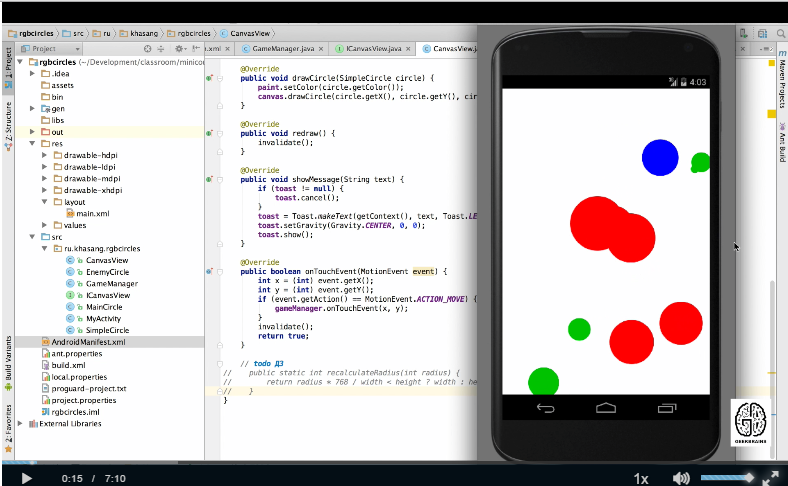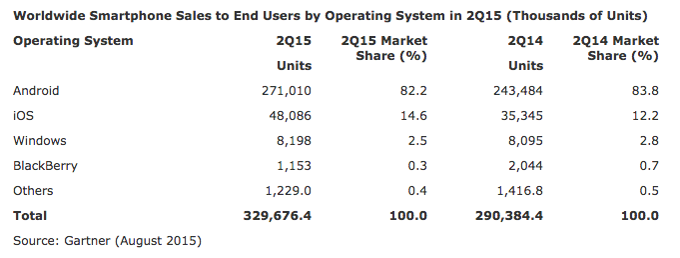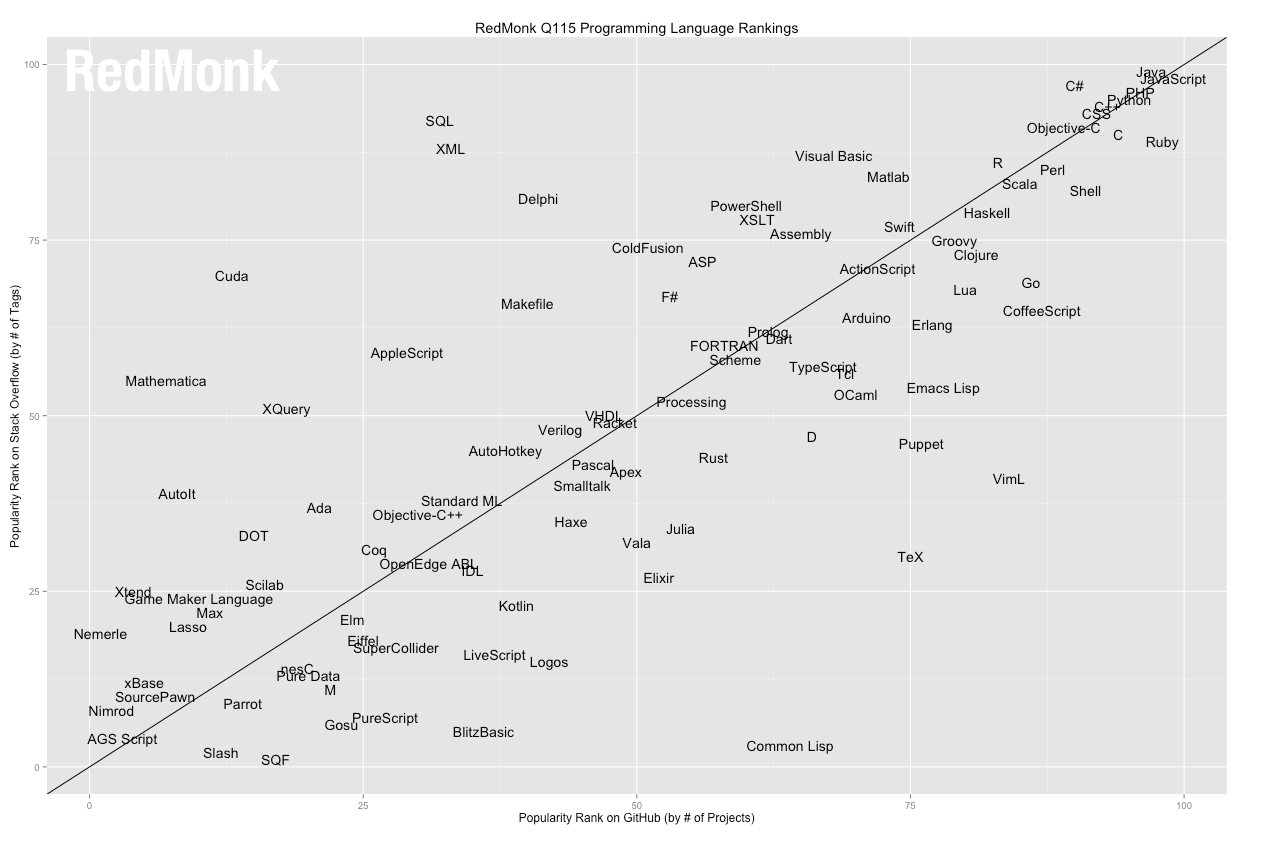Free course “Android. Fast start"

Lesson of the course “Android. Fast start"
The Android operating system, starting from the moment of the first release, has always attracted the attention of people from various business, programming and academic environments. The very fact of its birth brought to its creators, a California startup of four programmer friends, a tidy sum of 130 million dollars.
The story flows so fast that only the gray-haired hipsters of the beginning of this century remember that in one of the garages of the city of Palo Alto, not far from the walls of the alma mater of many IT corporations, including Sun Microsystems - Stanford University, in 2003 the time of the friendly party, the main ideas of the software product, which later became a world hit, were formulated.
')
Nobody canceled base values
Why did we mention Stanford and Sun? Not only in order to convey the spirit of freedom and creativity that prevailed at that time in Silicon Valley, but also so that since their introduction to Android, novice programmers understand that this OS does not appear as if by itself on a piece of paper and it was not written like this “on the knee” by a young talent.
Behind her were people who knew what they were doing and why. And they earned 130 million dollars in 2005 from the sale of their product to Google only prove this.
Stanford laid the academic foundation for this OS, Sun donated the Java programming language as a basic environment for developing application programs. And the “friends-neighbors” from Oracle (which bought Sun together with the Java language) with their numerous unsuccessful lawsuits helped Google to prove the legal purity of its purchase.
Openness as a major factor
From about this point (victory at Oracle), analysts recognized the immense market prospects of the operating system. Everyone suddenly realized its fundamental advantage over most of its competitors. Android is an open operating system for mobile devices that is not associated with any (almost) licensing restrictions, including the use of Java. And since the core of the OS itself is Linux, then, in general, there is nothing much to say on this subject.
This circumstance allows developers to freely distribute their software and applications without being restricted by copyright law. Unlike iOS, where applications can only be downloaded via the AppStore, Android can and does support a more flexible policy.
Ending the conversation about openness, it is necessary to note once again what the article began with - Linux, Java and Android themselves became what they are, only due to the efforts of like-minded communities that form full-fledged open ecosystems for all developers. Therefore, studying alone Android means going upwind, against the idea of free software. Full-fledged training for a long time implies only a collective immersion in the topic, which is possible only on courses under the guidance of experienced mentors.
But not only open source is the advantage of Android. Let's briefly look at a few of its key features:
Choosing a mobile operator
This item "shot" in full force at the very beginning of the conquest of the Android world. Apple, with its iOS, taking advantage of its monopoly position in the market at that time, set a course for rigidly binding its users to a limited set of mobile telecom operators. This may be not bad from a commercial point of view, but is fundamentally contrary to the freedom-loving policies of Google.
Possessing enormous advertising revenue and licensing fees from hardware manufacturers, gentlemen Larry Page and Sergey Brin (the founders and main shareholders of Google) kept their word for buying Android, the operating system itself and its distribution methods remained very democratic in terms of choice of partners. Is it any wonder the explosive growth in the popularity of this platform?
For reference, today, according to Gartner analysts, four out of five smartphones work on Android of different versions, everything else is shared by 3 or 4 vendors.

Data from a research and consulting company Gartner
Integration with Google services
Hand on heart, I must say that Google has put a lot of effort into promoting Android. This search giant has billions of users, accustomed to a variety of its web services: mail, social networks, cloud storages - there is no point in listing. Among them is the "diamond" - the service "documents", which became a thorn for another competitor - Microsoft. And all this if initially does not work on a standard mobile device, it requires minimal developer effort.
As is known, the brainchild of Bill Gates “slept through” the mobile revolution, concentrating on office and server products. And when about half of the population of the planet appeared on the hands of smartphones and tablets with Android, it turned out that the free "Documents" (and other competing products) disperse like hotcakes. Microsoft rushed to the chase, buying on the way the former superhero Nokia mobile market. But while they are far behind ...
Having started a little later than its main competitor iOS, Google is actively expanding the list of technological solutions for integrating them into Android and into Chrome OS, another corporation’s operating system based on terminal access technologies. It comes on the heels of Apple with its voice control system Siri latest Google Now technology.
You can list for a long time, many breakthrough achievements. The only thing holding back: the lack of qualified programmers. Therefore, Google has an impressive reward system for motivating students in Android technology. For example, in 2007, Google announced the first Android Developer Challenge with a prize pool of $ 5 million. The crisis crippled the prize fund of 2009 a little - $ 2 million, which, you see, is also decent.
Such events have become traditional and are held regularly: sensible people of the corporation are needed now and will be in demand for many more years. But with all this, it is noted: programming on the basis of the Android platform is relatively simple, it does not require such a serious start, as, for example, with Haskell.
Customization and support for third-party products
As you know, Android was not created for a certain elite group of people for whom owning a smartphone itself is more important than its practical use and customization capabilities. On the contrary, the community of users and developers insists (and this voice is always heard) that the operating system should have the functionality that is needed for work, and not for “ponts”.
As a result, Android programmers together with interface designers always consider several offers from customers about employment or project work on visualization and creating unique design features of devices and applications. For example, these can be widgets, icons that allow you to quickly access any phone function or application.
At the same time, unlike in some competing platforms, there is no obsession with some technologies, which theoretically may or may not become mainstream. For example, how many tubs, you know what, spilled on the heads of iOS programmers because of Apple's fanatical faith in HTML 5. As a result, a huge number of web resources using Flash technology flew past Safari browser. There are a lot of such examples, but where are the developers?
Resources for programmers
Describing the merits of a software platform is meaningless without the support of its main sponsor and ideologist. As for Google, then, again, this company has a strong open-sourced spirit. It is based on it and lives by it. This is not as an advertisement, but about the fact that having the main revenues in areas that are far from selling and licensing software, Google has made an enormous gratuitous contribution to the popularization of free software.
In addition to Android, there are a number of first-class products in this series: a set of JavaScript frameworks, text recognition engines, sounds, videos (for example, Tesseract), solutions for Big Data, the Chrome OS family, etc.
And what is the popularization of the operating system without detailed documentation on itself and the entire stack of application software that can work with it directly or remotely via an API? Something and Android documentation is enough for development at the most serious level. And none of this makes secrets. You just need to know what and where to look.
Development language: Java. Need to start with him
The operating system alone cannot cover all user needs. Therefore, application software written in various programming languages is used. Android supports something from the C family, and Go, and much more. But the basic Java programming language has always been.
Why? We will not describe, on the courses you will learn everything yourself. We can only say that in the famous popularity rating of the programming languages Java and JavaScript are fighting for the first and second places. At the same time, both of them are supported by the Android platform and applications based on it, although they are intended for different purposes and JavaScript is “sharpened” for working with the web.

Data analyst firm RedMonk
The goal of our course is to immerse listeners into the world of Android, filled with the most interesting history and philosophy of free software, to plunge into the paradigm of object-oriented programming in Java, and also to issue an “entrance ticket” to the global community of developers of this mobile platform. Believe me, it's worth it!
The first lesson is installing and configuring tools for developing a game with teacher comments. You will need a computer with Windows, Mac or Linux, along with the desire to learn new skills and acquire useful knowledge. And what will happen next - see .
Source: https://habr.com/ru/post/272579/
All Articles